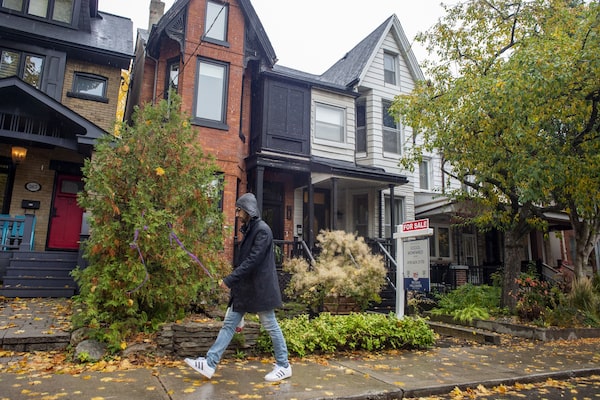
A house for sale on Major Street in Toronto on Oct. 26, 2022. Real estate prices and rents have soared in Toronto and construction of new homes has lagged population growth.Eduardo Lima/The Globe and Mail
Toronto has had a net loss of more than 11,000 young families over the past decade, a sign that the housing affordability crisis at the heart of the mayoral campaign is becoming an existential threat to the city’s future.
The statistic is one of a series of stark numbers pointing to the scale of the problem. Real estate prices and rents have soared, construction of new homes has lagged population growth, and development approvals can take years.
The combination has left an increasing number of people priced out of the city and made housing affordability one of the hottest topics in the race for Toronto’s June 26 by-election to replace John Tory. Approaches vary among the leading candidates, but most promise to ramp up construction, work on affordability and protect renters.
“It’s become increasingly politically unfeasible to be against housing, and against the construction of housing,” said Matti Siemiatycki, a professor in the department of geography and planning at the University of Toronto.
“I think what has won the day is the recognition that the housing crisis is so broad and it affects so many different people. It could be somebody’s children, it could be their extended family, it could be colleagues, it could be people in their community that they know and see around.”
The race is also happening amid pressure from the province for Toronto to facilitate more housing. Premier Doug Ford’s government has set a 10-year target for the city of 285,000 new homes – 68 per cent more than Toronto managed over the past decade.
Not only has Toronto failed to keep pace with housing demand, the city has also concentrated almost all development into small spaces. The result has been a localized boom in condo tower construction even as some areas, such as the desirable Annex neighbourhood, where swaths of single-family homes have long been protected from new density, lost population.
At the same time, people unable to find suitable housing in Toronto have spread out across southwestern Ontario, leading to an exodus of young people the city would like to retain. Among the people voting with their feet were young families. According to census information, 18.3 per cent of families in Toronto had at least one child under 5 in 2011. By 2021 that had dropped to 15.7 per cent, a 14-per-cent decline.
Economist Mike Moffatt, the senior director of policy and innovation at the Smart Prosperity Institute, said that this reflects the city losing its middle class.
“These people tend not to move back,” he said, pointing to San Francisco as an example of a city suffering the effects of being increasingly divided into wealthy and lower income.
“No society can flourish without a strong middle class.”
There has been evidence in recent years that city hall has started to grasp the scale of the problem.
Toronto approved laneway houses citywide in 2019, though few have been built to date.
In mid-December, council passed Mr. Tory’s 2023 Housing Action Plan, which included allowing more density across the city. The plan secured the backing of two-thirds of councillors and Mr. Tory had no cause to wield his strong-mayor powers, which the province says were conferred to help get housing built and allowed him to override the majority will of council in specific instances.
And last month the city eliminated zoning that had long preserved most of Toronto’s residential land for single-family detached houses. As a result, fourplex apartments will be allowed in all neighbourhoods. This idea, which was central to Mr. Tory’s plan, was politically toxic even a few years ago.
The tenor on the campaign trail has also been different from some past races, with no leading candidate openly courting the votes of those who don’t want to build. None is promising a significant departure from the city’s current plan as they try to burnish their credentials as pro-housing.
Former councillor and MP Olivia Chow has pledged to have Toronto build 25,000 rent-controlled homes on city-owned land while also working to prevent people from being unfairly evicted. Mark Saunders, the former chief of police, has promised to remove the property tax from future affordable housing developments and allow more density “where appropriate.”
Councillor Josh Matlow has promised a new municipal agency to oversee building on city-owned land and a support program for tenants that he says would improve rental affordability. And Ana Bailão, a former councillor, has pledged incentives for densification and says she will ensure 20 per cent of homes built through 2031 are affordable.
The leading candidates are split on whether they would be willing to use the strong-mayor authority to override council and achieve their goals. Ms. Chow and Mr. Matlow are opposed to these powers while Mr. Saunders and Ms. Bailão are open to them.
Whoever wins, it remains to be seen whether they will be able to move the needle on affordability. Most housing is built by the private sector, which is affected by interest-rate changes and other economic factors. Toronto can encourage such housing through things such as streamlined development approvals, but can’t make it happen.
At the same time, the city has no control over federal immigration rates, which influence housing demand. And measures that could reduce shortages of skilled labour are within the purview of the provincial government.
“The candidates are taking lots of stances and putting forth detailed housing platforms,” said Karen Chapple, director of the School of Cities at the University of Toronto. “And in four years it would be really interesting to look back on those platforms and see how much they were actually able to do, because the issue is so complicated.”
 Oliver Moore
Oliver Moore